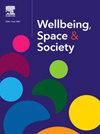鲁尔地区的心理健康——社区特征与抑郁症之间的联系
IF 2.2
Q2 GEOGRAPHY
引用次数: 0
摘要
在控制各种相关因素的情况下,很少有实证研究考察邻里环境对心理健康的影响。本文通过分析Heinz Nixdorf多代研究(N = 2,897,年龄范围= 18-90岁)的数据来解决这一差距,这些数据来自2013年至2016年德国姆本文章由计算机程序翻译,如有差异,请以英文原文为准。
Mental health in the Ruhr – Links between a neighborhood's characteristics and depression
Few empirical studies have examined the impact of neighborhood context on mental health while controlling for various relevant factors. This paper addresses this gap by analyzing data from the Heinz Nixdorf Multigenerational Study (N = 2,897, age range = 18–90 years) of residents in Mülheim an der Ruhr, Essen, and Bochum (Germany) from 2013 to 2016. Using cluster-robust logistic regression, we investigated how neighborhood factors influence the likelihood of depression, accounting for individual-level characteristics.
The findings indicate that high urbanization, perceived lack of nighttime safety, and especially neighborhood socio-economic disadvantage significantly increase the risk of depression, especially when considering length of residence. These results highlight the significant impact of socially disadvantaged neighborhoods on mental health, underscoring the need for targeted interventions to prevent extreme socio-spatial segregation.
求助全文
通过发布文献求助,成功后即可免费获取论文全文。
去求助
来源期刊

Wellbeing Space and Society
Social Sciences-Social Sciences (miscellaneous)
CiteScore
2.70
自引率
0.00%
发文量
46
审稿时长
124 days
 求助内容:
求助内容: 应助结果提醒方式:
应助结果提醒方式:


